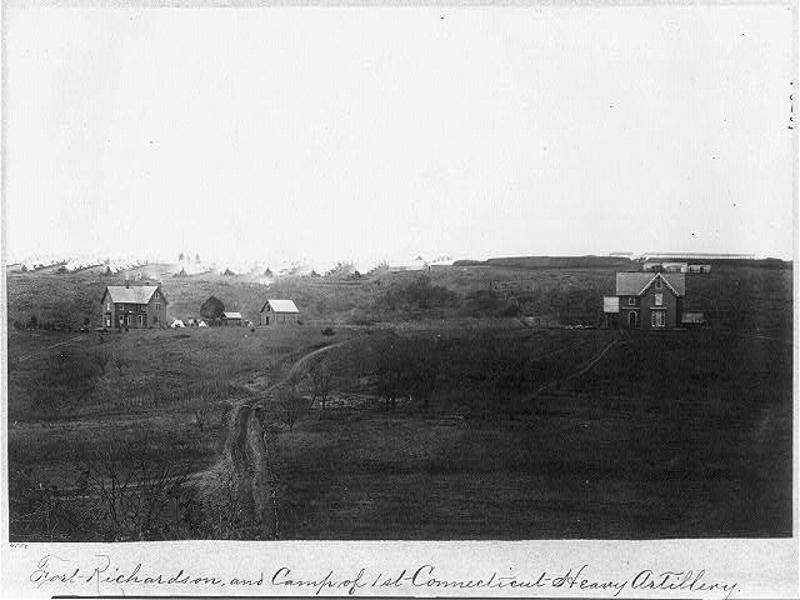 |
| Fort Richardson, Defenses of Washington (NPS.gov) |
June 10, 1863-2. 30 p. m. (Received 5. 10 p. m.)
His Excellence the PRESIDENT OF THE UNITED STATES:
Mr. PRESIDENT:General Plasonton, by telegram forwarded to the major-general commanding the army this morning, reports that he had an affair with the rebel cavalry yesterday near Brandy station, which resulted in crippling him so much that he will have to abandon his contemplated raid into Maryland, which was to have started this morning. I am not so certain that the raid will be abandoned from this cause. It may delay the departure a few days. I shall leave the calvary, which is all that I have mounted, where they are, near Bealeton, with instructions to resist the passage of the river by the enemy`s forces. If to effect this he should bring up a considerable force of infantry, that will so much weaken him in my front that I have good reason to believe that I can throw a sufficient force over the river to compel the enemy to abandon his present position. If it should be the intention to send a heavy column of infantry to accompany the cavalry on the proposed raid, he can leave nothing behind to interpose any serious obstacle to my rapid advance on Richmond. I am not satisfied of his intention in this respect, but from certain movements in their corps I cannot regard in this respect, but from certain movements in their corps I cannot regard it as altogether improbable. If it should be found to be the case, will it not promote the true interest of the cause for me to match to Richmond at once? From there all the disposable part of this army can be thrown to any threatened point north of the Potomac at short notice, and, until they can reach their destination, a sufficiency of troops can be collected to check, if not to stop, his invasion. If left to operate from my own judgment, with my present information, I do not hesitate to say that I should adopt this course as being the most speedy and certain mode of giving the rebellion a mortal blow. I desire that you will give it your reflection. At present the enemy has one corps of infantry at Gordonsville, with the advance at Culpeper, with the manifest tendency of other corps to drift in that direction. I now have two bridges across the Rappahannock, ready to spring over the river below Fredericksburg, and it is this, I believe, that causes the enemy to hesitate in moving forward. Major-General Dix informs me that he intends moving two columns on James Fiver to-morrow; but if organized to corresponded in numbers to the troops as they have of late been posted, neither column will be successful. The one on the north side of the river will be too small, and on the south side, with his whole column, I question if Richmond can be taken at all, provided 2, 000 or 3, 000 men could be assembled to defend it. The columns should unite at City Point, or below, and move on the north bank of that river. From information. which I deem reliable, the only troops remaining in Richmond is the provost-guard, 1, 500, and all the troops between here and there are brought well to the front. It would be of incalculable service to this army to be transferred to some more remote point from Washington and Alexandria. The stampedes in those towns, gotten up, no doubt, by people in the rebel interest, have their influence on my men, for many of them have no means of knowing whether they are with or without cause. They think there must be some fire where their is so much smoke.
JOSEPH HOOKER,
Major-General.
WASHINGTON, June 10, 1863-6. 40 p. m.
Major-General HOOKER:
Your long dispatch of to-day is just received. If left me, I would not go south of Rappahannock upon Lee`s moving north of it. If you had Richmond invested to-day, you would not be able to take in it twenty days; meanwhile your communications, and with them your army, would be ruined. I think Lee`s army, and not Richmond, is your sure objective point. If he comes toward the Upper Potomac. follow on his flank and on his inside track, shortening your lines while he lengthens his. Fight
him, too, when opportunity offers. If he stays where he is, fret him and fret him.
A. LINCOLN.
WASHINGTON, D. C., June 11, 1863-12. 40 p. m.
Major-General HOOKER,
Army of the Potomac:
The President has just referred to me you telegram and his reply of yesterday, with directions to say to you whether or not I agree with him. I do so fully.
H. W. HALLECK,
General-in-Chief. -
Official Records, Series I., Vol. 27, Part 1, Page 35.
Hooker hoped to have stopped Stuart moving north with Pleasanton's attack on Brandy Station. But whether or not he did, Hooker believes Lee is moving north. Rather than follow him on he perferred to immediately steal a march on Richmond. Lincoln and Halleck didn't agree, thinking of the damage Lee could inflict north of the Potomac during the time it would take Hooker to invest and take Richmond. Lincoln ignored his own frequent advice to field commanders not to assume the enemy capable of doing things you yourself cannot. In this case there were still heavy forces within the fortifications of Washington. It would be no easier for Lee to take Washington than for Hooker to take Richmond.
No comments:
Post a Comment